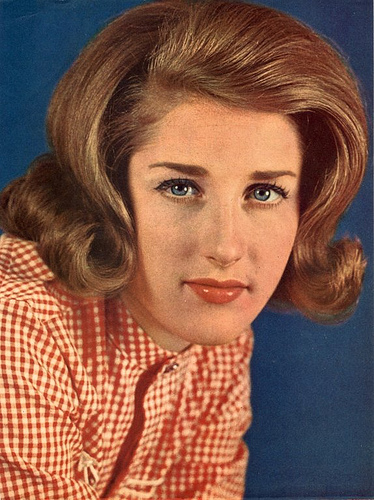 One of the strong female voices in rock ’n’ roll came out of a teenager in Tenafly, N.J., whose very first hit was the anthem “It’s My Party.”
One of the strong female voices in rock ’n’ roll came out of a teenager in Tenafly, N.J., whose very first hit was the anthem “It’s My Party.”
“I was a junior in high school,” she told me in an interview in 2000. She died Monday in New York of lung cancer at 68.
Her long career began almost as a fluke. She had been going into New York for voice lessons as a teen and cut some demo recordings as more of a lesson than something serious.
But some people at Mercury Records got a hold of them and passed them on to Quincy Jones.
`He was looking for a teenage person to record, seeing there was this whole new youth market out there. He thought it would be worthwhile to get someone out there,” Gore told me. “So he called me and asked me to record.”
Their first session was “It’s My Party,” recorded on a Saturday afternoon and rushed into release the following week, when Jones found out Phil Spector was recording the same song with the Crystals.
“I heard it six days later, driving home from school, on the New York station WABC,” Gore said. “It was overwhelming.”
Gore followed up her hit two months later with something of a sequel to the party tears of her debut. “Judy’s Turn to Cry,” written by a different set of writers, gave her a second Top 5 hit at age 17.
But her fourth Top 5 hit that year (following “She’s a Fool”) was perhaps her strongest.
“You Don’t Own Me,” an anthem of independence and feminist ideals, was years ahead of its time.
During the 2012 presidential campaign, she turned the song into an online public service spot demanding reproductive rights that featured Lena Dunham, among others.
“If `It’s My Party’ was the only song that I ever recorded, I would have been looked upon as a one-shot pop artist. `You Don’t’ Own Me’ gave me substance,” Gore said. “It was the best record I ever recorded.”
She also performed it at one of the most remarkable concert documents of the era — “The T.A.M.I Show” in 1965, which also featured key performances from James Brown, the Rolling Stones and the Supremes, among others.
“That was a pretty startling event,” Gore recalled. “The most shocking thing: I’ll never forget when I came out on stage, the audience was screaming so loud, I couldn’t hear the orchestra. I thought, `How am I ever going to know when to sing?’ That was really frightening.”
Brown was also part of the cast of “Ski Party,” in which Gore also starred. She also sang in the teen movie “Girls on the Beach.”
“They’re still on cable,” she said with a little embarrassment. “People call me at 4 in the morning and tell me it’s on. When they can’t sleep.”
She got more notoriety when she appeared on TV’s “Batman” as Catwoman’s sidekick Pussycat in a couple of episodes. In her pink hears and fuzzy tail on her tight outfit, it almost undid any feminist gains she won in “You Don’t Own Me.”
Some fans more interested in the Batman roles than the hits regularly showed up at her concerts, which she continued to do up until recent years. `One or two at each show,” Gore said. “You always know them right away.”
Gore’s music has stayed current through the years, a precursor to the women in rock movement. Joan Jett famously recorded her own hard-edged version of “You Don’t Own Me.”
“I thought that was pretty cool,” Gore said. “I liked that version a lot.”
“It’s My Party” also inspired the moniker of the D.C. group that books the 9:30 Club and Merriweather Post Pavilioin, I.M.P.
Gore was interested in writing songs all along — though her early work tended to be on the albums and not the hits. When her recording career cooled in 1967 following such hits as “Maybe I Know,” “Sunshine, Lollipops and Rainbows” and “California Nights,” she concentrated on writing.
She collaborated with her brother Michael Gore on songs for the hit “Fame” soundtrack including the Oscar nominated “Out Here on My Own.”
Besides performing in revues with Ronnie Spector and LaLaBrooks, she sang on stage in “Smokey Joe’s Cafe” and worked on a stage version of her own life — one she thought would never sustain a whole career.
I didn’t think of it as a vocation. I thought of it as an avocation. I never thought it was really a way to make a living,’’ she said.
Indeed, even during her hottest years, she continued to attend classes at Sarah Lawrence. “I had this sense that if I stopped school, I wouldn’t go back to it. So continuing it was important to me,’’ she said.
Even in school, she didn’t concentrate on music, majoring in English and American literature, with a minor in theater.
Of the contemporary young female pop singers of the day, Gore said she admired them.
“They grew up knowing what they want to do. I wasn’t that confident of my way. I give them a lot of credit,’’ she said. “I would have done well to get advice from them.”